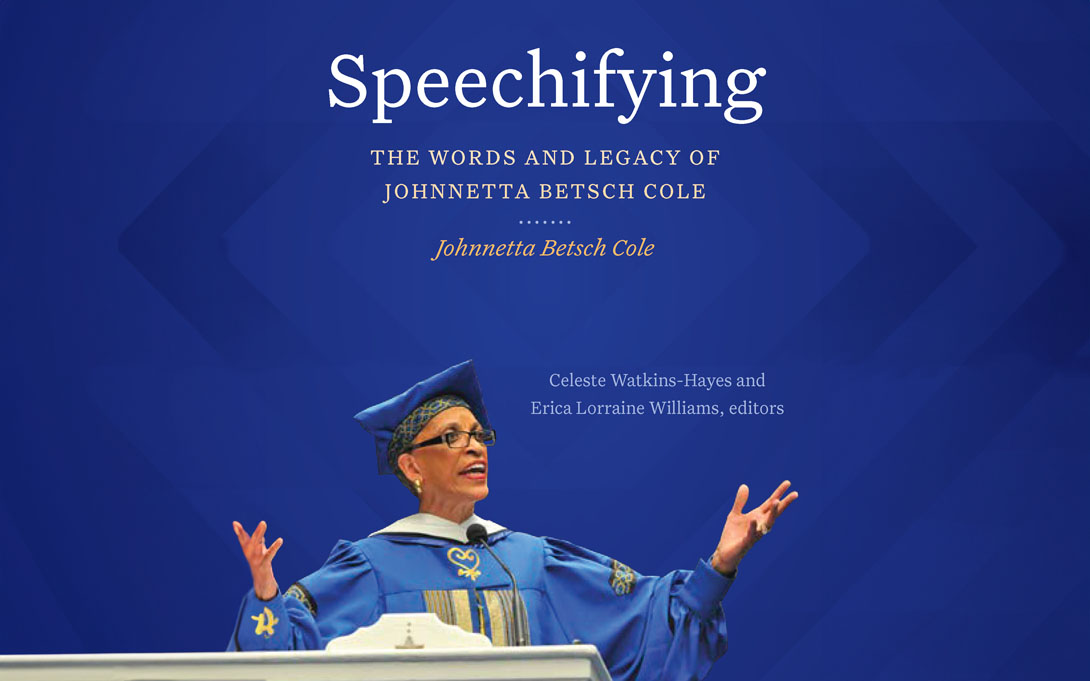
Ford School Dean Celeste Watkins-Hayes is honoring one of her great mentors, Dr. Johnnetta Betsch Cole — noted Black feminist anthropologist, the first Black female president of Spelman College, former director of the Smithsonian Institution's National Museum of African Art, and former chair and president of the National Council of Negro Women – through compiling Cole’s most important speeches into a volume, Speechifying, which is released in August 2023 (published by Duke University Press).
Watkins-Hayes was joined by another academic leader and fellow Cole mentee, Spelman anthropologist Erica Lorraine Williams.
A powerful and eloquent orator, Cole demonstrates her commitment to the success of historically Black colleges and universities, her ideas about the central importance of diversity and inclusion in higher education, the impact on her life and activism of growing up in the segregated South, and her belief in public service.
Drawing on a range of Black thinkers, writers, and artists as well as biblical scripture and spirituals, her speeches give voice to the most urgent and polarizing issues of our time while inspiring transformational leadership and change. Speechifying also includes interviews with Cole that highlight her perspective as a Black feminist, her dedication to public speaking and “speechifying” in the tradition of the Black church, and the impact that her leadership and mentorship have had on generations of Black feminist scholars.
Watkins-Hayes says of her mentor, “Johnnetta Cole’s insights are as relevant today as they were when she first shared them with me, and with the world. Her dedication and commitment to diversity, equity, inclusion, and anti-racism–and the spirit she has brought to that work–is exactly what we need now.”
For co-editor Williams, the significance of Cole's speechifying lies in its ability to speak across differences. The rhetorical tradition of Speechifying enables Cole to speak to very diverse audiences, not just in terms of racial diversity but also class diversity within Black communities. While the written word may only reach a certain segment of the population, speechifying is more widely accessible to a larger audience.
The volume covers important themes that Cole addressed, including The Importance of Historically Black Colleges and Universities, Feminism and Women’s Empowerment, Race and Racism, and The Fierce Urgency of Diversity, Equity, and Inclusion.
------------------------------------------
BOOK EXCERPTS:
“What is the continuing significance of the Gettysburg Address? I think the answer is captured in the first and last lines of this two- minute speech. President Lincoln marked the Battle of Gettysburg as a turning point in the Civil War and he reframed the war as a struggle for human rights and the principle upon which our nation was founded. Thus, he made it clear that the many who had died in the battle had sacrificed their lives in support of the principles of human equality and self- government.
Beginning with the words, “Four Score and Seven Years Ago,” Lincoln lifted up the bold— indeed the bodacious— proposition in the Declaration of Independence that “all men are created equal.” Remember: slave owners argued they had a constitutional right to own slaves. Thus, in the Gettysburg Address, President Lincoln implied that the constitution had to change in order to bring forth “a new birth of freedom.”
- “The Continuing Significance of President Lincoln’s Gettysburg Address,” February 12, 2017
“Much of my optimism stems from a belief in education as a powerful instrument for change. But I mean a particular kind of education— the kind of education that prepares stu-dents to understand themselves and their world; the kind of education that inspires students to help change the world for the better and thereby transform themselves. In Spelman’s second century that is the kind of education we will pursue.
At Spelman, we will continue to guide students into intellectual confrontations with themselves and with the world around them— and we will continue to use the liberal arts curriculum as the major force that demands that confrontation.
But as we continue to embrace the liberal arts tradition, we must dare to critique it— not for whom and what it has traditionally included, but because of all of the peoples and realities that have been systematically left out. We cannot claim to understand our world or ourselves if we fail to consciously include in our analyses the realities of half of the world’s people— women— and over two thirds of the earth’s inhabitants, people of color.”
- “Another Day Will Find Us Brave,” President’s Inaugural Address, November 6, 1988
Advance Praise:
“Speechifying is a unique piece of scholarship. Focusing on Johnnetta Betsch Cole’s extraordinary oratorical practice as an academic, college administrator, museum director, and social activist, this collection highlights her career as a public intellectual—a woman who has made the most of her extraordinary gifts throughout her stellar career.” — A. Lynn Bolles, author of Women and Tourist Work in Jamaica: Seven Miles of Sandy Beach
“What emerges from this meticulously researched and passionate collection of Dr. Cole’s speeches—delivered to diverse audiences over decades—is the most compelling and informative portrait of one of our most influential and productive Black feminist scholar-activist-leaders. We are indebted to the editors, Professors Watkins-Hayes and Williams, for this loving, thorough scholarly project that makes a major contribution to African diaspora studies, women’s studies, and leadership studies as well as to Dr. Cole's home discipline, anthropology.” — Beverly Guy-Sheftall, Anna Julia Cooper Professor of Women’s Studies, Spelman College
